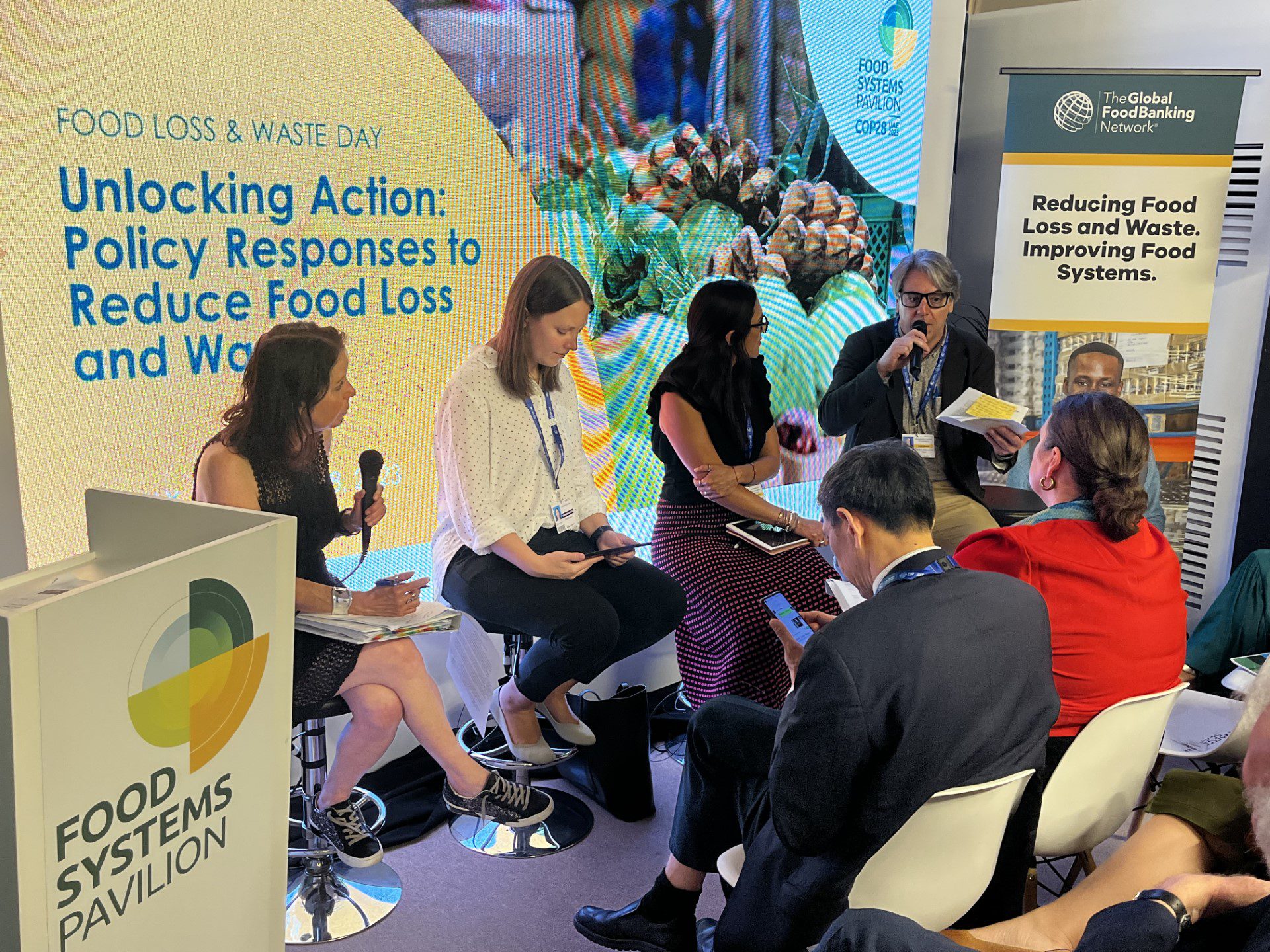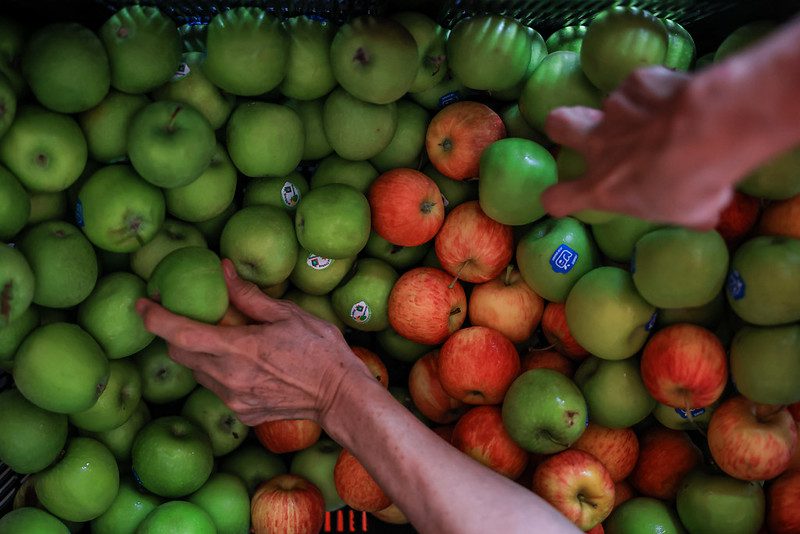Four leading NGOs co-host a series of sessions at COP29 to highlight the urgency and benefits of taking national and international action on food loss and waste
NOVEMBER 7, 2024 ― As leaders gather in Baku, Azerbijian, to drive climate action, The Global FoodBanking Network, WRAP, ReFED, and FareShare are joining together to advance policies and on-the-ground solutions to reduce food loss and waste, address hunger and protect the planet.
The world loses and wastes over 1 billion tons of food every year, around a third of global production. Food loss and waste (FLW) not only contributes to more food insecurity, but is responsible for as much as 10% of global greenhouse gas emissions, as well as 12% of methane emissions—a greenhouse gas that is 86 times more potent than CO2 in the first 20 years for its global warming effects. Widespread action today on FLW can have an impact on greenhouse gases in the short term, while ensuring more people are able to get the nutrition they need.
The organizations will host a series of sessions on Food Loss and Waste at the Action on Food Pavilion (Blue Zone), where they will bring together leaders and experts to dig into policies and legal frameworks, explore methods and innovations, and highlight projects and solutions from around the world. These sessions will include representatives from government, business, multilaterals and other civil society organizations.
Together, these sessions will serve as a space to raise awareness, explore ideas and spur momentum on these issues.
Click here or see below for details on each session.
Following are quotes from representatives from these organizations on the importance of addressing food loss and waste:
“Around the world, food banks are already doing essential work of recovering and redistributing food for people and the planet. These community-led organizations are making progress—and they are looking to leaders to spur greater action. COP29 is a great opportunity to elevate food loss and waste on the global agenda and encourage more people to join us in this growing movement with partners like WRAP, ReFED, and FareShare,” said Lisa Moon, president and CEO of The Global Food Banking Network.
“When WRAP first attended COP26, no mention was made of the huge impact our food system has on climate change. The following year saw the first Food Pavilion, and at COP28, 160 countries signed the Declaration on Sustainable Agriculture and Food System Transformation. We must build on this momentum at COP29 and that’s why we stand with ReFed, the Global Food Banking Network and FareShare to focus on food. WRAP is encouraging more action from more countries – we need food loss and waste to be urgently prioritized in all plans for tackling climate change such as NDCs,” said Richard Swannell, Director of Impact Growth at WRAP.
“In the United States, uneaten food is responsible for five percent of annual greenhouse gas emissions, including nearly four million metric tons of methane—or about 14 percent of U.S. methane emissions. Preventing wasted food and diverting organic material to recycling are some of the most accessible and immediate actions we can take to drastically cut greenhouse gas emissions and mitigate the worst effects of climate change. We’re thrilled to partner with The Global FoodBanking Network, WRAP, and FareShare to drive attention to this critical opportunity at COP29,” said Dana Gunders, president of ReFED.
“At COP28 in Dubai, governments worldwide committed to the Emirates Declaration, a landmark promise to integrate food systems into national climate strategies. Reducing food loss and waste is crucial to achieving this shared global objective. That’s why FareShare is proud to partner with WRAP, ReFED, and The Global FoodBanking Network at COP29 to lead a series of events focused on transforming our food system to lessen its impact on the climate. As the UK’s largest food redistribution charity, FareShare is deeply concerned about the environmental impact of food waste. Surplus food redistribution is vital to meeting food loss and waste targets, turning would-be waste into support for communities in need. Our ‘Where’s The Food?’ manifesto outlines policies the UK could adopt to increase surplus food redistribution, taking inspiration from best practices worldwide,” said Kris Gibbon-Walsh, CEO at FareShare.
About The Global FoodBanking Network
Food banking offers a solution to both chronic hunger and the climate crisis. GFN works with partners in more than 50 countries to redirect surplus, healthy food to those who need it. In 2023, our Network provided food to more than 40 million people, reducing food waste and creating healthy, resilient communities. We help the food system function as it should: nourishing people and the planet together. Learn more at foodbanking.org.
Contact: James Fredrick, jfredrick@foodbanking.org
About WRAP
WRAP is a global environmental action NGO catalysing policy makers, businesses and individuals to transform the systems that create our food, textiles and manufactured products. Together these account for nearly 50% of global greenhouse emissions. Our goal is to enable the world to transition from the old take-make-dispose model of production to more sustainable approaches that will radically reduce waste and carbon emissions from everyday products. To do so we examine sustainability challenges through the lens of people’s day-to-day lives and create solutions that can transform entire systems to benefit the planet, nature and people.
Contact: Ian Palmer, ian.palmer@wrap.ngo
About ReFED
ReFED is a U.S.-based nonprofit that catalyzes the food system toward evidence-based action to stop wasting food. We work to increase adoption of food waste solutions across the supply chain by cultivating and convening the food community, delivering actionable evidence and insights, and seeding and accelerating promising initiatives. Our vision is a sustainable, resilient, and inclusive food system that makes the best use of the food we grow. To learn more about solutions to reduce food waste, please visit www.refed.org.
Contact: Nate Clark, nate.clark@refed.org
About FareShare
FareShare is the UK’s biggest charity tackling food waste to support social good. We take good-to-eat surplus food from across the food industry, sort it in our regional warehouses across the UK, and pass it onto a network of over 8,000 charities and community groups. These include school clubs, community centres and pantries, hostels, refuges, older people’s lunch clubs, and hospices. Three quarters of the organisations we provide food to, support children and families. During the last financial year, 2023-24, FareShare redistributed the equivalent of over 134 million meals – four meals every second. The 56,000 tonnes of food we redistributed stopped 100,000 tonnes of COe2 going to waste. www.fareshare.org.uk
Contact: Kitty Langton, kitty.langton@fareshare.org.uk
SESSION DETAILS
DATE: FRIDAY, 15 NOVEMBER
Title: Leading by Example: National Policies and Action on Food Loss and Waste
Location/Time: Action on Food Hub (Blue Zone); 14:30-15:30 (Baku)
Description: This session will explore how governments can demonstrate national and international leadership in advancing policies to reduce food loss and waste. The session will highlight countries that have put in place strategies and policies – such as promoting surplus food redistribution, implementing waste taxes and bans, and mandating separate food waste reporting.
The session will feature government representatives and experts from a range of countries to share insights into how to mobilize support for national policies and how to convert this progress into the global food system transformation agenda.
Title: Tackling Methane: Strategies to Reduce Food Loss & Waste Across the Supply Chain
Location/Time: Action on Food Hub (Blue Zone); 16:00-17:00 (Baku)
Description: This session will explore how governments and companies can make progress and drive innovation to reduce methane by reducing food loss & waste throughout the food supply chain. Speakers will highlight the latest developments in methane measurement and management, and how improvements in data and tracking can accelerate progress. Audiences will also hear examples from the private sector, waste organizations, and other influential actors working to reduce methane emissions from food loss and waste.
DATE: TUESDAY, 19 NOVEMBER
Title: Building Global Momentum on Food Loss & Waste: Highlighting Action and Solutions
Location/Time: Action on Food Hub (Blue Zone); 10:00am (Baku)
Description: This session will explore how governments can demonstrate national and international leadership in advancing policies to reduce food loss and waste. The session will highlight countries that have put in place strategies and policies – such as promoting surplus food redistribution, implementing waste taxes and bans, and mandating separate food waste reporting.
The session will feature government representatives and experts from a range of countries to share insights into how to mobilize support for national policies and how to convert this progress into the global food system transformation agenda.
DATE: WEDNESDAY, 20 NOVEMBER
Title: “Reduction and Recovery of Food Loss & Waste: A Win for Biodiversity and Climate Change”
Location/Time: Methane Action Hub, Blue Zone; 14:00-15:30 (Baku)
Note this session is co-hosted by The Global Methane Hub and The Global FoodBanking Network
Description: This session will address how reducing food loss and waste simultaneously mitigates climate change through reduced methane emissions, conserves biodiversity, and enhances food security for vulnerable populations.
Join us for a groundbreaking session exploring how reducing food loss and waste can protect biodiversity and mitigate climate change. Leading experts from government, industry, and NGOs will share innovative solutions and forge partnerships for action. Learn how FLW reduction offers a unique opportunity to address multiple global challenges while creating a lasting positive impact.



